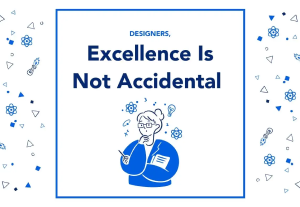- Artificial Intelligence, Business Value and ROI, Defining AI, Employee Experience
The answer relies upon psychological science.
Article by Emeric Kubiak
AI in the Workplace: How to Get Everyone Onboard?
- According to the author, AI is booming; it’s considered critical to success in the next five years by 94% of business leaders.
- Some fears and concerns remain when AI is implemented, and companies often underestimate people- and change-management aspects.
- Psychological science about change can help promote AI acceptance through seven phases of concern.
Share:AI in the Workplace: How to Get Everyone Onboard?
Share this link
- January 10, 2023
6 min read

- Behavioral Science, Design, Design Theory, Human factors
More autonomy and less dependency can improve our toxic relationship with digital technologies and benefit all of us, says Alexander Steinhart.
Article by Alexander Steinhart
Designers And Developers Pay More Attention To Human Autonomy
- The majority of tech companies concentrate on attracting active users and increasing consumption. Additionally, their economic incentives conflict with our own values and aspirations as users.
- According to the author, we should adhere to the rules of responsible, ethical, and humane design referred to as Design for Human Autonomy.
- There are 3 conditions to design for human autonomy:
- The user and their interactions with others should be prioritized over their use of the digital service;
- In the end, consumers are encouraged to navigate mainly without the software itself;
- The app’s values are transparent, and it respects the users’ values and objectives.
Share:Designers And Developers Pay More Attention To Human Autonomy
Share this link
- January 4, 2023
5 min read

- Behavioral Science, Design, Design Theory, Human factors, Interviews, Psychology and Human Behavior
Visualising 10 types of bias in 10 visuals.
Article by Steffan Morris Hernandez
10 Types of Cognitive Bias To Watch Out For In UX Research & Design
- The article covers how crucial it is to address cognitive biases for navigating daily life as well as UX research and design. Our judgment and thought processes become biased, which might distort reality in accordance with our preconceived notions.
- The author illustrates 10 examples of real-life cognitive biases and their reflection in UX research.
Share:10 Types of Cognitive Bias To Watch Out For In UX Research & Design
Share this link
- January 3, 2023
5 min read

- Design, Design Theory, Direct Observation Research, UX Education, UX World Changing Ideas
Chilling effects and data privacy.
Article by Joanna Ngai
Design Fictions
- Nowadays, people tend to change their online behavior because of the constant feeling of surveillance – this phenomenon is called the “chilling effect”. It affects all users, however, younger Internet users are more aware of their privacy navigation.
- Nothing is private now – every realm of human life stays on the Internet forever.
- Under such circumstances, the design’s future trajectory is not something the author is comfortable with. She advises always considering whether what you’re building helps increase sustainability while making design decisions.
- Technology should remain a tool, design should satisfy a need, and neither should cause a decrease in human agency by pandering to our primary instincts. According to the author, negative drawbacks are something a designer should always keep in mind.
Share:Design Fictions
Share this link
- December 29, 2022
5 min read

- Consumer products, Contextual User Studies, Customer Experience, Information Design and Architecture, Interaction Design, Product design, Product Releases and Redesigns, Usability, Voice & Natural Language
A case study on how Booking.com leveled up its UX through trial and error.
Article by Noa Barbiro
Introducing Voice Search Experience at Booking.com
- The author demonstrates the showcase of introducing a voice search experience at one of the global online travel companies – Booking.com.
- The article leads us through every stage of shipping a product using machine learning and a new UX and interaction:
- A product discovery process for user requirements led to the initial step in creating conversational interaction and prioritizing MVP features.
- After that, the team matched the list of software and algorithmic parts to either already-existing or yet-to-be-built capabilities.
- The next step is to establish a taxonomy of relevant user journeys and intents (actions we should support and map to the appropriate app screens and inputs).
- The design and initial interface for the app’s home screen were created as the final step to enable users to conduct any post-booking or search action using voice commands.
- There is always room for improvement when introducing an innovative experience. Constant work in research and development is a key to a smoother and more individualized experience through a better understanding of intents.
Share:Introducing Voice Search Experience at Booking.com
Share this link
- December 28, 2022
7 min read

- Agile and Iterative Process, Business UX Leaders, Design, Personal and Professional Development, Strategy, The rise of design, UX Education
Excellence is deliberate.
Article by Nate Schloesser
Designers, Excellence Is Not Accidental
- The author speculates on reaching excellence in design backing the arguments with his own experience of delivering product strategy for Internet and Screen Accountability software Covenant Eyes.
- Excellence in design is not something that comes to you naturally; it is deliberate and comes with effort.
- Excellence starts with mastering design skills through learning, making mistakes, and, eventually, making a habit of putting to work everything you’ve learned.
- In the pursuit of excellence, intelligent execution is an essential step. The author advises that you should always take into account the environment in which the plan is to be implemented. Also, you should have a thorough awareness of the framework and the organization you are working with.
Share:Designers, Excellence Is Not Accidental
Share this link
- December 27, 2022
6 min read


